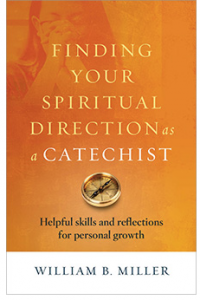
An excerpt from Finding Your Spiritual Direction as a Catechist
By William B. Miller
Chapter 7: Forgiveness
If you were to ask a dozen people to give you a list of the most important characteristics of a healthy spirituality, you would probably get twelve distinct lists. However, one characteristic that is likely to be found on each of those lists is forgiveness — both the desire to seek it and the desire to grant it.
Forgiveness: Asked and Offered
Because we are not divine but human, we have all experienced two distinct contexts regarding forgiveness. One is the need to ask forgiveness of someone whom we have offended. The other is the need to offer forgiveness to one who has offended us. Either of these contexts for forgiveness can often be situated within very difficult circumstances. Yet dealing with and learning from both situations is a necessary prerequisite for living a life in harmony with the message and the mission of Jesus Christ. Once we have managed to deal constructively (in a healthy manner) with the need for forgiveness in our own lives, we are better prepared to support others who are seeking the courage, wisdom, and compassion to forgive those who have offended them and/or to ask forgiveness of those they have offended. Occasionally a situation in which both aspects of forgiveness are involved will present itself.
Megan and Bridget
Several years ago, when I was hosting a diocesan catechetical conference, Megan, a catechist, friend, and member of my parish, approached me with a troubled look on her face. “I have a hard time teaching my students about forgiveness,” she said. She went on to describe what a difficult virtue it is to put into practice. “Sometimes, when I am teaching the principle, sharing what Jesus says about it and how he was willing to forgive even those who crucified him, I feel like a hypocrite.” She then told me the following story.
Megan had a job as a shift supervisor for nurses at a local hospital. Over the years she worked hard to become an advocate for both the patients and the nurses under her supervision. Over a period of many months, she felt that her section was being overlooked for upgrades to equipment and programs designed to make the rigors of nursing more manageable and more pastoral. Funding that she felt should be coming to her wing seemed to be going to Bridget, the nursing supervisor in a different part of the hospital. Correctly or incorrectly, it was Megan’s perception that Bridget was favored by the head of nursing, who made decisions about training, funding, and programs. In her frustration, Megan made a derogatory comment to some of her nurses about Bridget. The comment got back to Bridget who wasted no time retaliating. She did so by starting a nasty rumor about Megan, based on what Megan insisted was unsubstantiated innuendo.
Now it was Megan’s turn to be offended. While some of her friends chose not to believe the rumor about her, others wondered if there might be some truth in it. Megan’s integrity was called into question and she was devastated.
rumor about her, others wondered if there might be some truth in it. Megan’s integrity was called into question and she was devastated.
Many months went by and Megan and Bridget were unable to reconcile their differences. Megan grew tired of the feud and the energy it was taking from her life. Bridget was still furious at Megan for her actions and convinced that Megan was not worthy of forgiveness. Eventually, both women retired from their jobs, without resolving the conflict.
Megan was stuck. She wanted to move on, both spiritually and emotionally. She had come to realize that some things were simply out of her control, but she felt she was being held captive by the situation. All aspects of her life were suffering, even her role as a catechist, because a significant part of her spiritual and psychological growth was frozen in time. This was her state of mind when she approached me at the conference
An Invitation from the Lord: Learning to Forgive
Forgiveness is one of the most difficult and complicated principles to teach and to practice. There are several reasons why this is so. For one thing, it goes against our instincts. When we are hurt, we tend to want to fight back, to “get even,” to “settle the score.” But Jesus says: “Be merciful, just as your Father is merciful … Forgive and you will be forgiven” (Luke 6:36–37). And when Peter asked the Lord how often he should be willing to forgive those who sin against him, Jesus said: “Not seven times but seventy-seven times” (Matthew 18:21–22).
Sometimes, forgiveness is difficult to practice because it calls for deep and candid introspection on our part. We must ask ourselves questions such as:
- How have I contributed to this rupture in relationship that is causing tension and pain?
- Am I willing to take responsibility for my own actions and to apologize for anything that helped create this difficult situation?
- Am I willing to admit that I have things to learn about the fragile but important nature of human relationships?
- Am I willing to act upon my learnings, thereby giving evidence of conversion/change of heart?
- Even if I am willing to forgive and willing to seek the forgiveness of the other person, can I accept that we might never be reconciled, because the other person may not be willing to forgive me or may not be willing to accept any culpability for the damage to our relationship?
These are tough questions, but they must be carefully considered: only if we are willing to answer “yes” to each one are we truly prepared to seek and to grant forgiveness. We must learn to forgive ourselves in order to be able to forgive others.
C.S. Lewis writes: “If God forgives us we must forgive ourselves. Otherwise it is almost like setting up ourselves as a higher tribunal than God.”
Until we can accept that God forgives us for any and all of our transgressions, we cannot begin to forgive ourselves, nor can we truly forgive another for offending us.
The ability to accept forgiveness as well as the ability to extend forgiveness are greatly impacted by our ability to accept love and to love another. This important concept takes us back to a foundational principle of Catholic Christianity upon which all other aspects are based: our belief that God loves us unconditionally and that nothing we can do, short of denying God and God’s love for us, can block the flow of God’s love and grace into our lives. Like the ability to love and to experience love, the ability to forgive and to experience forgiveness is a divine gift. It is one that frees us from what family counselor Earnie Larsen has called “a heavy stinking bag of resentment.”
To forgive someone is not to suggest that what they did to us was all right. It simply says that we are not going to let what they did destroy us.
Megan’s Forgiveness
When Megan first came to me with this problem, we agreed that a spiritual director might be able to help her sort it out and move forward. After hearing how long and how much Megan had been struggling with this situation, her director said: “Megan, you are putting a lot of psychological and spiritual energy into holding onto the hurt that you have felt at the hands of Bridget. You might want to consider how to deal with the parts of this story that you have some control over and how to surrender the remainder of the story and the resulting pain to God.
Megan went away and prayed, considering all these things in her heart. When she returned for her next appointment she told her spiritual director that she was able to admit her own culpability. “It is not entirely Bridget’s fault. I hate what she did to me, and I hate the fact that she has never made any attempt to apologize, but I can’t control those things. What I can control is my own action. I think I need to write a letter to her sincerely apologizing for the hurt that I caused her.”
Megan’s spiritual director reminded her that she should not necessarily expect a reply to the letter. That was entirely up to Bridget. However, Megan could do two very important things in order to align her own spirit with the Spirit of God in this matter. First, she could write and send the sincere letter of apology and, second, she could pray to God for the grace necessary to release the anger in her heart in order to forgive Bridget.
To my knowledge, Megan has not received any response from Bridget. However, she has been able to forgive herself for the pain she caused and to forgive Bridget for lashing out at her. Equally important, Megan has felt a heavy load lifted from her shoulders and has a new spring in her step, especially when she walks into the room where she serves as a catechist. She enjoys teaching lessons on forgiveness, especially after the hard-won wisdom and freedom she has gained during her spiritual journey.
FOR REFLECTION
[NOTE: These questions are suggested for private reflection only. The responses may be too personal to share publicly.]
- Can you name someone you have offended whom you have never asked for forgiveness? What makes it hard for you to ask that person for forgiveness? How might you prepare yourself in order to ask him or her to forgive you?
- Is there someone who has hurt you so severely that you have not been able to forgive them? What is holding you back from forgiving that person? What would help you prepare your soul and spirit so that you could forgive?
PRAYING WITH SCRIPTURE
MATTHEW 6:14–15
MATTHEW 18:21–22
LUKE 6:27–42
LUKE 15:11–32
PRAYING WITH MUSIC
(These songs are available on YouTube, see the links below.)
“Hosea” | Gregory Norbet, Mary David Callahan
“Forgiveness” | Matthew West
“The Hurt and the Healer” | Mercy Me
“Come as You Are” | Crowder
Excerpted from Finding Your Spiritual Direction as a Catechist, by William B. Miller. 2017. Published by Twenty-Third Publications (twentythirdpublications.com). Used with permission. All rights reserved.
William B. Miller, MEd, is a trained spiritual director and a retreat leader. He is the author of Finding Your Spiritual Direction as a Catechist (Twenty-Third Publications). Bill resides with his wife, Marilyn, in Akron, Ohio.
Photo credits: Banner Photo by Nicole Wilcox on Unsplash
Book Photo: Twenty-Third Publications




